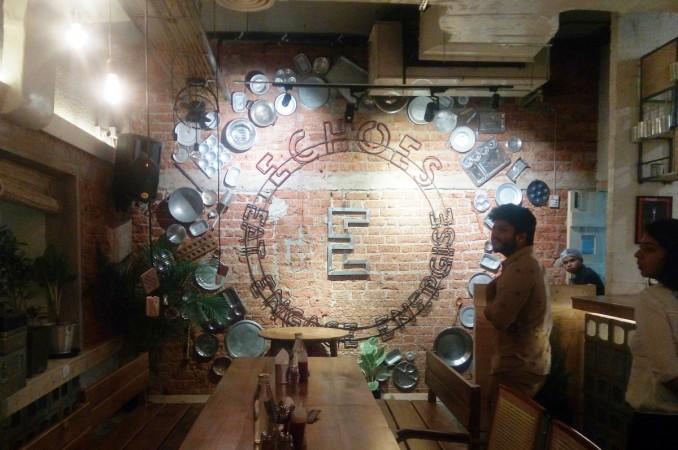
You enter and take a seat. You press a switch, and the waiter comes along with a menu, a writing pad and a pen. You choose what you want to order, write it down in the pad, the waiter takes it and comes back in a few minutes with your food and beverage. Pretty normal, right? That is exactly how Echoes Koramangala — the second restaurant of the chain that opened over the weekend gone by — is functioning, with all its eight hearing and speech-impaired waiters.
In the beginning
The first of these restaurants is in Delhi, started by childhood friends Shivansh Kanwar, Kshitij Behl and Sahil Gulati, who collaborated with Shivansh's brother Gaurav and his colleagues Sahib Sarna and Prateek Babbar. Their first idea was for a food truck, but ultimately it crystallised into a cafe that was run by differently-abled people. "We wanted to sell the experience. We wanted it to be such that as soon as people entered, they would be taken in by the vibe," Shivansh told International Business Times, India.
They managed to get the Noida Deaf Society involved in their search for differently-abled employees, and the organisation helped place two of their first waiters for the Delhi restaurants. Then came two more, who brought with them their contacts on a Facebook page for the deaf and mute looking for jobs, and there was no looking back after that.

Echoes Koramangala in Bengaluru started functioning on Saturday, March 18, and already had a full house by the evening of Sunday (March 19). Shivansh explained that the waiters for this location came from Enable India. The first three of their differently-abled waiters here brought along three more people, and soon two more were added, bringing the total strength to eight.
How it functions
Shivansh explained to IBTimes, India, how the entire system works: "Above each table is a light switch that corresponds to a light bearing the number of the table. All a patron has to do to attract the attention of the waiter is to press this switch, and the wait staff will almost immediately at the table, carrying the menu, an order pad and a pen."

He added: "The menu contains the dish code of what the patron wants to order. He or she has to write this dish code, its quantity [how many plates per dish] and any customisations [like 'no salt' or 'extra cheese'] in the order pad, and the waiter will be back soon with the dish!" The patrons also have 10 cue cards on their tables, through which they can ask for forks, knife, water or the menu, or can give feedback about the waiters' service.
While the entire group of waiters at Echoes is hearing and speech-impaired, the kitchen staff are not. Shivansh said that that is one place where communication needs to be verbal. It now remains to be seen how this restaurant — which is possibly the first of his kind, although some chains do employ deaf and mute people to clear tables — fares amid the gaggle of eateries coming up in the busy Koramangala area of Bengaluru.















